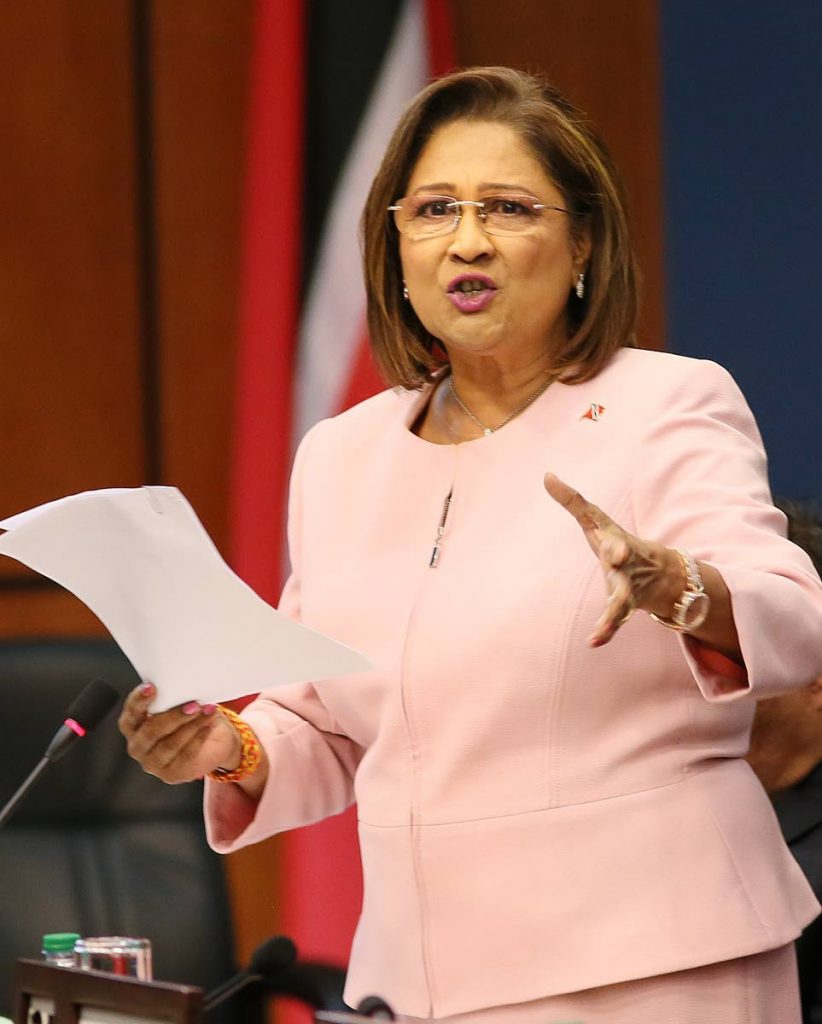Kamla: Paria Fuel in serious trouble

After less than eight months of existence Paria Fuel Trading Ltd is in serious financial trouble, and this is a significant threat to the supply of fuel to the nation, says Opposition leader Kamla Persad-Bissessar.
Speaking at the UNC's Monday Night Forum in Fyzabad, she said a letter was dropped in her mailbox. It was from the chairman of Paria, Wilfred Espinet, to Energy Minister Franklin Khan and was dated June 7. She quoted, “An ongoing shortfall of US$20 million per month to purchase refined fuels to ensure supply to the country – this is a structural problem that is going to result in a shortage of fuels unless corrected.”
Persad-Bissessar commented, “That is a very serious issue. The chairman of Trinidad Petroleum Holdings, Wilfred Espinet, said so. What is that US $20 million shortfall about?"
She asked whether the oil company is losing US$20 million per month, saying at today’s rate of exchange, that was TT$140 million.
“That is not losing money. It is hemorrhaging money,” she said.
She told supporters if this company has to find US$20 million of TT dollars per month to buy fuel it may have to increase the price of fuel at the pumps for the everyday citizen.
It is clear, she said, that Paria Fuel Trading, the company with the sole responsibility for importing this country’s fuels, such as super, diesel, premium, kerosene and jet fuel, is in big trouble.
“This is what you get when you shut down Petrotrin and you had no plan post-Petrotrin,” Persad-Bissessar said, and the decision to close down Petrotrin would be the biggest economic debacle in the history of this country.
The letter she quoted mentioned another immediate risk the failure to implement ex-terminal pricing for imported fuel, despite the company's implementing a formula since November.
This, she said. was the height of incompetence on the part of Khan. She said Espinet went on in the letter to add another immediate risk" "The inability to secure two letters from the Ministry of Energy and the BIR to close the 2018 year-end audit and finalise long-term financing. Requests for both these letters have been pursued daily for several months."
This means Petrotrin cannot publish financial statements for 2018, she said, because of outstanding issues regarding royalty payments to the Energy Ministry and outstanding issues over taxes owed to the Board of Inland Revenue.
“This speaks to massive incompetence at the Ministry of Energy, the Ministry of Finance and at Trinidad Petroleum Holdings, where all the Petrotrin accountants and finance people were fired and they can’t find documents,” she said.
When you consider the loss of production, the loss of revenue, the loss of sales of refined products and the cost to settle with workers, she said, the closure of Petrotrin is a debacle because it was not properly thought out but done with spite, malice and contempt.
On Petrotrin bonds and loans she said next month Petrotrin has to pay US$850 million, which is more than TT$5 billion, to bondholders it owes for a bond taken out in 2009 by the Malcolm Jones PNM-appointed board of Petrotrin.
She claimed, “They cannot make that payment, and officials went to the bondholders and asked them to refinance the bond to 2026 at 9.75 per cent interest, which is an excellent interest rate, but bondholders refused the offer.”
As a result, she said, government had to borrow the remainder of the money from a syndicate of banks to make the US$850 million payment.
“It seems the Petrotrin candle is costing more than the funeral,” Persad-Bissessar said.
She declared that after four years the PNM had killed Petrotrin and now it was killing the National Gas Company. NGC, she said is also in trouble, thanks to political interference in natural-gas price negotiations in March 2017. She said the Prime Minister and National Security Minister Stuart Young arrogated unto themselves the responsibility for negotiating natural-gas prices for the NGC with EOG Resources in a hotel room in Houston.
“The result of that intrusion is, on the one hand, the NGC having to pay a lot more for natural gas, while on the other hand having to sell it to its customers in some cases at a loss,” she said. Maybe, Persad-Bissessar said, that was one reason why Gerry Brooks hustled and resigned from the NGC: he saw the writing on the wall.
She said at the PNM’s Let’s Talk Energy session in Point Fortin Khan said the Guaracara refining and storage facilities were very likely to be leased to an international operator because there is no indigenous capacity to run a refinery of that size and complexity. So, she said the Oilfield Workers Trade Union’s bid is in the wastebasket. She slammed the Rowley administration on the comment that there was "no indigenous capacity" to run the refinery, saying that was how highly the government thought of its people.
She said the UNC has a plan to reconsolidate Petrotrin into a fully integrated oil company, starting back up the Pointe-a-Pierre oil refinery on the most efficient and economical basis.
“By restarting Petrotrin, we will not have to import fuel and will avoid energy-price risk, save foreign exchange, provide meaningful jobs and ensure the company continues to contribute to the Treasury,” she said.
She also called on the PM to reveal the date of the local government elections.

Comments
"Kamla: Paria Fuel in serious trouble"